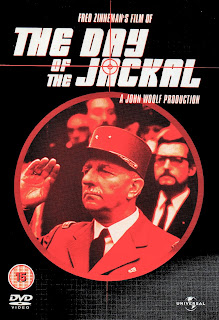I have just finished reading Frederick Forsyth's The Cobra (2010) - does any paperback not claim The New International Bestseller on its front cover? - which focuses on the deadly international cocaine trade. Moving between Washington, London, South America, West Africa and Europe, it is certainly a compelling and frightening tale.
Frederick Forsyth (1938- )
Forsyth is a fact-finding/checking journalist as much as a novelist and this is both his strength and, occasionally, weakness. His love of (admittedly accurate and meticulous) detail can slow the pace down but it is a minor fault. He is an admirer of John Buchan's thrillers and it shows. The cold-blooded, nameless killer, known only by his codename of Jackal, thwarts the security net until the end. The 1973 film, directed by Fred Zinnemann is excellent in its own right. The planning and movements of the Jackal are paralleled with the forces of law and order straining to trap him. Edward Fox as The Jackal, Michel Lonsdale as his police pursuer, Cyril Cusack as a doomed supplier, Alan Badel and other actors are all on top form. I have watched the DVD four or five times, but de Gaulle always gets away with it.
The Odessa File, set in a world of clandestine arms deals (with warheads of nuclear waste and bubonic plague) and international espionage, is equally thrilling, but even more disturbing. The repellant Nazi war criminal, protected by Odessa (the organisation of former SS men) is pitted against Mossad, the Israeli intelligence service. Once again, the film (directed by Ronald Neame and released in 1974) matches the book. Jon Voigt is convincing as Peter Miller, the post war journalist, who is out for vengeance on the man who killed his father in cold blood during the War - SS Captain Eduard Roschmann. Maximilian Schell exudes evil in his sinister portrayal of Roschmann. There were excellent cameo parts too, played by Derek Jacobi and Peter Jeffrey. Once or twice, the pace dragged, but I have watched the DVD two or three times and, like The Day of the Jackal, will surely do so again.
The Day of the Jackal (1973) and The Odessa File (1974) both figure in my Top Twenty films. They are the ones which I return to every so often, never tiring of viewing them again.
Others are (at present): two of Alfred Hitchcock's films: Notorious and North by Northwest;
The Barchester Chronicles (1982); Bride and Prejudice (2004); Casablanca (1942); Cold Comfort Farm (1995); The Go-Between (1970); How Green was my Valley (1941); A Man for all Seasons (1966); A Month in the Country (1987); The Quiet Man (1952); Laurence Olivier's Richard III (1955); Room with a View (1986); The Third Man (1949); Twelfth Night (1996); Roman Holiday (1953); Three Days of the Condor (1975); and Visconti's Death in Venice (1971).
N.B. The latter two films have a tenuous link. Max von Sydow, that compelling actor, died recently (8th March). He was, as usual, excellent in Three Days of the Condor - as Joubert, who led the massacre of Robert Redford's co-workers and who now hunts him down.
Bruce Anderson, in The Spectator this week, had this to say about Dirk Bogarde in Death in Venice: I always thought that Dirk Bogarde was miscast as Gustav von Aschenbach in the film of Death in Venice. He came across as a fussy valetudinarian, throwing away the drama of Aschenbach's crumbling and collapse, as his refined, ascetic self-disciplined morality proves powerless against subconscious stirrings. We observe him succumb to forbidden beauty, the lures of the south, the overthrow of caution: all ending in illness and death. With a face that resembled Rodin's bust of Mahler, von Sydow would have been more suitable to convey all that.






No comments:
Post a Comment